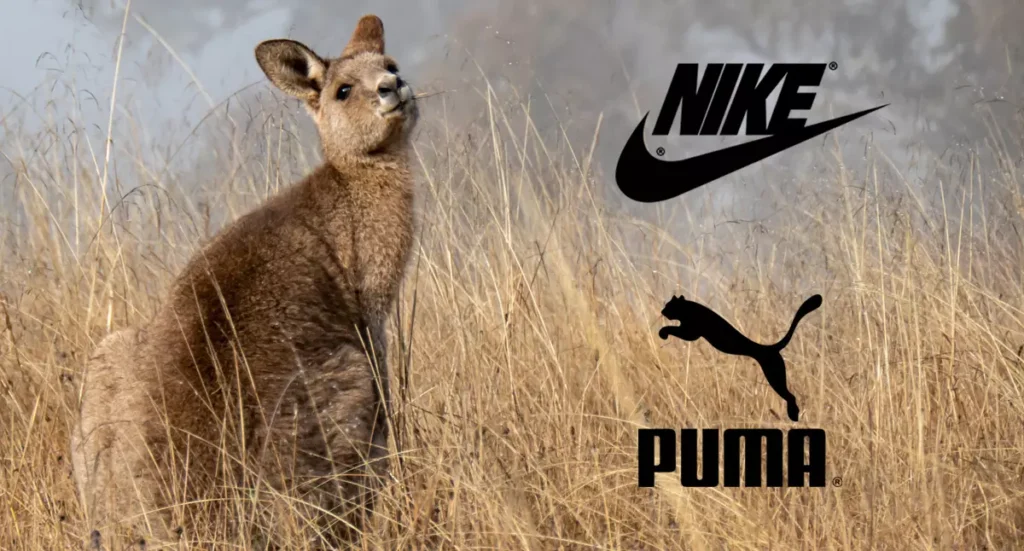The two big brands in athletic footwear announced plans last March to halt any use of kangaroo skins in their shoes by the end of 2023
Washington, D.C. — The Center for a Humane Economy noted that the start of the new year is the trigger for Puma and Nike to put into practice their March 2023 pledges to halt sourcing of kangaroo skins for their multiple models of soccer cleats. The Germany-based Puma announced in early March that it would phase out its use of kangaroos for all soccer cleat uppers within 10 months, and, just days later, the U.S.-based Nike followed suit with a similar announcement and timeline. Both companies pledged to complete the transition to kangaroo-based shoes by the end of 2023.

“Commercial killing of kangaroos in the wilds of Australia for their skins has always been driven by exports, mainly to the major athletic shoe brands,” noted Wayne Pacelle, president of the Center for a Humane Economy and Animal Wellness Action. “These humane-minded corporate policies, now in effect, should translate into the sparing of hundreds of thousands of kangaroos every year.”
When the Center for a Humane Economy announced its Kangaroos Are Not Shoes campaign three years ago, there were 2 million wild kangaroos killed in their native habitats each year, including about 500,000 joeys who were collateral damage of the intentional killing of adults. That kill may have declined by about 700,000 since the campaign started, and with these new policies in effect, it should recede further.
The joeys die after the shooters orphan them by slaying their mothers in night-time shoots. The industry’s commercial code instructs the hunter to then kill the joey by blunt force trauma to the head, which is often accomplished by slamming the joey against the bumper of a car or another hard surface.
In September, the U.S.-based New Balance informed the Center for a Humane Economy that it, too, would alter its sourcing policies and that the company will phase out its use of kangaroo skins and halt sales of kangaroo-based shoes by December 2024. The Center applauded New Balance for the announcement and is asking the Boston-based company to accelerate the application of its new policy as soon as it is practicable. Diadora, the Italy-based athletic wear company, announced a no-kangaroo-skin policy in 2021, and that policy is already in effect.
Since the inception of the Kangaroos Are Not Shoes campaign, four of the five biggest global athletic shoe brands have announced policies to stop sourcing kangaroo skins for athletic shoes. Adidas, based in Germany, is the major outlier among the five big brands. There are several other shoe companies still using kangaroo skins, including Mizuno, based in Japan.
Nike, Puma, and New Balance pledging in 2023 to eliminate kangaroo skins from their offerings and to embrace sustainable synthetics clinches a trend that has been in place for years. Out of 172 goals scored in last year’s World Cup, 164 came from players wearing synthetic shoes or conventional leather (though synthetics dominated).
Last month, animal activists throughout the world joined forces over an early December weekend to disrupt Adidas stores and alert customers to the corporation’s involvement in the largest mass slaughter of terrestrial wildlife in the world. Led by the Animal Justice Party and Their Turn, and as part of the Center for a Humane Economy’s Kangaroos Are Not Shoes campaign, more than 30 animal welfare organizations supported hundreds of people who hit the streets in 20 locations (and online) in cities in Australia, United States, Canada, Italy, Germany, Netherlands, Spain, Ireland, and New Zealand.
“Adidas is now the biggest contributor to the mass killing of joeys in their native habitats,” said Jennifer Skiff, director of international programs for the Center for a Humane Economy. “No company should knowingly cause this kind of suffering to newborns. These innocent animals are guilty of no offense, and alternative fabrics abound for a company known for its innovations.”
Leading a bipartisan group of three Republicans and three Democrats as sponsors, U.S. Representatives Brian Fitzpatrick, R-Penn., and Jan Schakowsky, D-Ill., introduced the Kangaroo Protection Act, H.R. 4995, in the fall to ban the sale of kangaroo body parts in the United States. A U.S. Senate companion bill will soon be introduced. The United States, the European Union, and China are the biggest markets for soccer cleats in the world.
As part of their Kangaroos Are Not Shoes campaign, the Center for a Humane Economy and Animal Wellness action produced a groundbreaking report in June 2020. Animal Wellness Action and the Center have also assisted in the introduction of both federal and state legislation banning the import and sale of kangaroo products — most recently, for example, in Arizona, Connecticut, New Jersey, Oregon, and Vermont. Multiple lawsuits have also been filed in California in the summer of 2022 and early 2023, alleging that soccer retailers are illegally selling cleats made of kangaroo leather in violation of state law.

